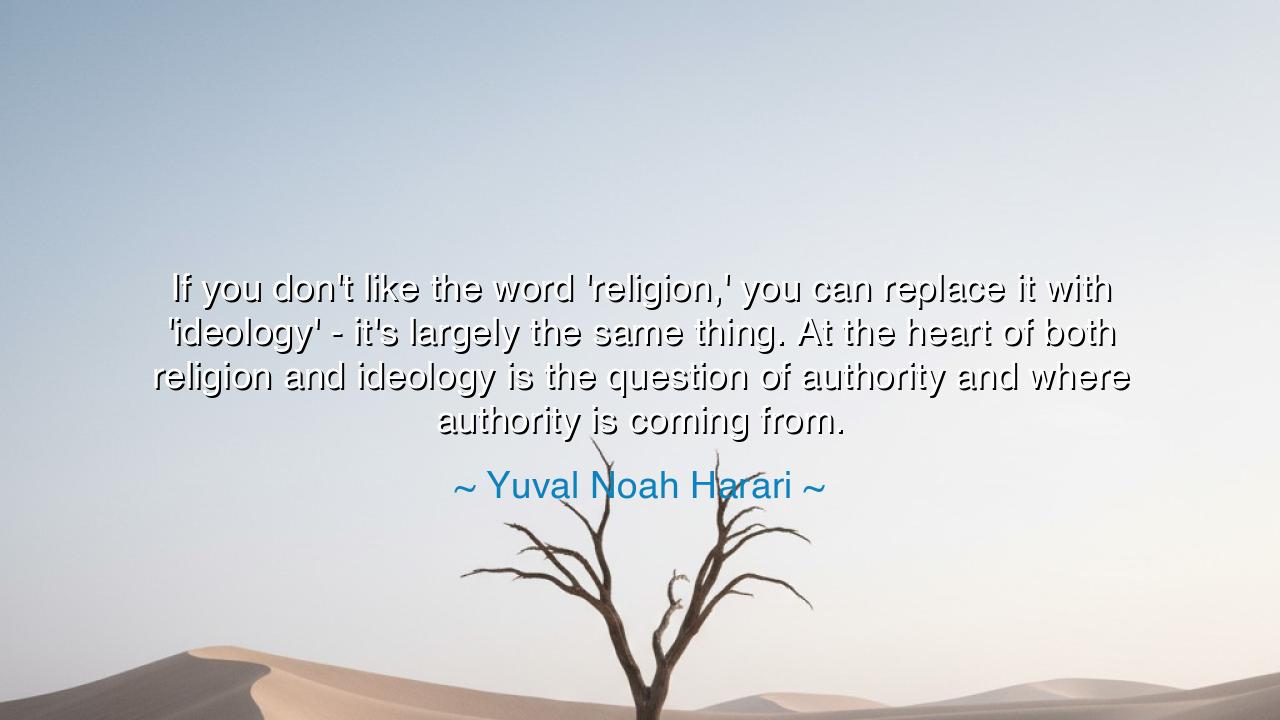
If you don't like the word 'religion,' you can replace it with
If you don't like the word 'religion,' you can replace it with 'ideology' - it's largely the same thing. At the heart of both religion and ideology is the question of authority and where authority is coming from.






When Yuval Noah Harari, the philosopher of history and the chronicler of civilization’s soul, said, “If you don’t like the word ‘religion,’ you can replace it with ‘ideology’ — it’s largely the same thing. At the heart of both religion and ideology is the question of authority and where authority is coming from,” he was lifting the veil that separates the sacred from the secular, revealing that both are bound by a single, ancient thread — the search for authority. His words pierce through the illusions of modernity, reminding us that whether man bows before a god or a government, a holy book or a constitution, the heart of belief is always the same: who do we obey, and why?
The origin of this insight comes from Harari’s lifelong study of human history — from the rise of tribes and temples to the march of nations and revolutions. In his works, particularly Sapiens and Homo Deus, he teaches that humanity’s greatest power lies in its ability to weave shared myths — stories that bind millions into a single purpose. In ancient times, these myths were called religions; in modern times, we call them ideologies. Both shape how we see the world, how we live, and how we justify our choices. Both answer the same eternal questions: What is right? What is wrong? Who decides?
Harari’s words speak to a deep truth: though we imagine ourselves free of religion in this age of reason, we have merely traded one altar for another. The gods of old may have fallen silent, but their thrones have not remained empty. In their place now sit new idols — nations, markets, science, and political movements. Where once men prayed to Zeus or Yahweh, now they pledge allegiance to capitalism, socialism, democracy, or nationalism. Yet in every case, the same spiritual impulse endures: the need to find meaning and order in a chaotic world, the need to believe that our obedience serves something greater than ourselves.
Consider the story of the French Revolution, when the people, weary of monarchy and the Church, tore down the old symbols of faith and enthroned the goddess Reason in their stead. They sought to escape religion, yet they built a new one in its image. There were hymns and ceremonies, priests and martyrs, sacred texts and unyielding dogmas. In the name of reason, they shed blood as their ancestors had done in the name of God. This is what Harari meant: that whether faith takes the form of the cross or the flag, of scripture or party manifesto, the human spirit remains bound to the same force — the yearning to believe, and to surrender to an authority that gives life structure and purpose.
And so, Harari’s insight is not a condemnation of religion, nor of ideology, but a warning. It is a call to awareness — that authority, once unexamined, becomes tyranny, whether it wears the robes of the priest or the suit of the politician. Blind faith, whether in heaven or in history, has led mankind to both glory and ruin. For when people cease to question where authority comes from — when they accept power as divine or inevitable — they become its servants rather than its stewards. To live wisely, therefore, is to ask, again and again: Who commands me, and why do I obey?
There is also, in Harari’s words, a profound humility. He reminds us that the need for belief is not a weakness, but a part of our humanity. We are creatures of imagination; without shared stories, there can be no civilization. But every story — even the most noble — can harden into dogma if we forget that it was made by human hands. Religion and ideology alike must be held with reverence, yet also with reason. For authority, like fire, can give light or destroy — it must be tended with wisdom, not worshipped with fear.
The lesson, then, is this: do not flee from belief, but understand it. Recognize the sacred wherever it appears — in churches, in parliaments, in classrooms, and in the hearts of dreamers. But never surrender your freedom of thought, for that is the soul’s truest altar. Question your gods, whether divine or political; ask of them justice, mercy, and truth. If they fail to answer, do not bow. Build anew, but build with humility, knowing that every new creed carries the seeds of its own corruption.
So, my child, remember the wisdom of Yuval Noah Harari: religion and ideology are twin flames — both capable of warming the human spirit or burning it to ash. The difference lies not in the altar, but in the heart of the believer. Therefore, keep your faith, but let it breathe. Let your loyalty serve truth, not power; compassion, not conquest. For the only authority worthy of man is the authority that makes him more human — wise in mind, humble in heart, and free in spirit.






AAdministratorAdministrator
Welcome, honored guests. Please leave a comment, we will respond soon